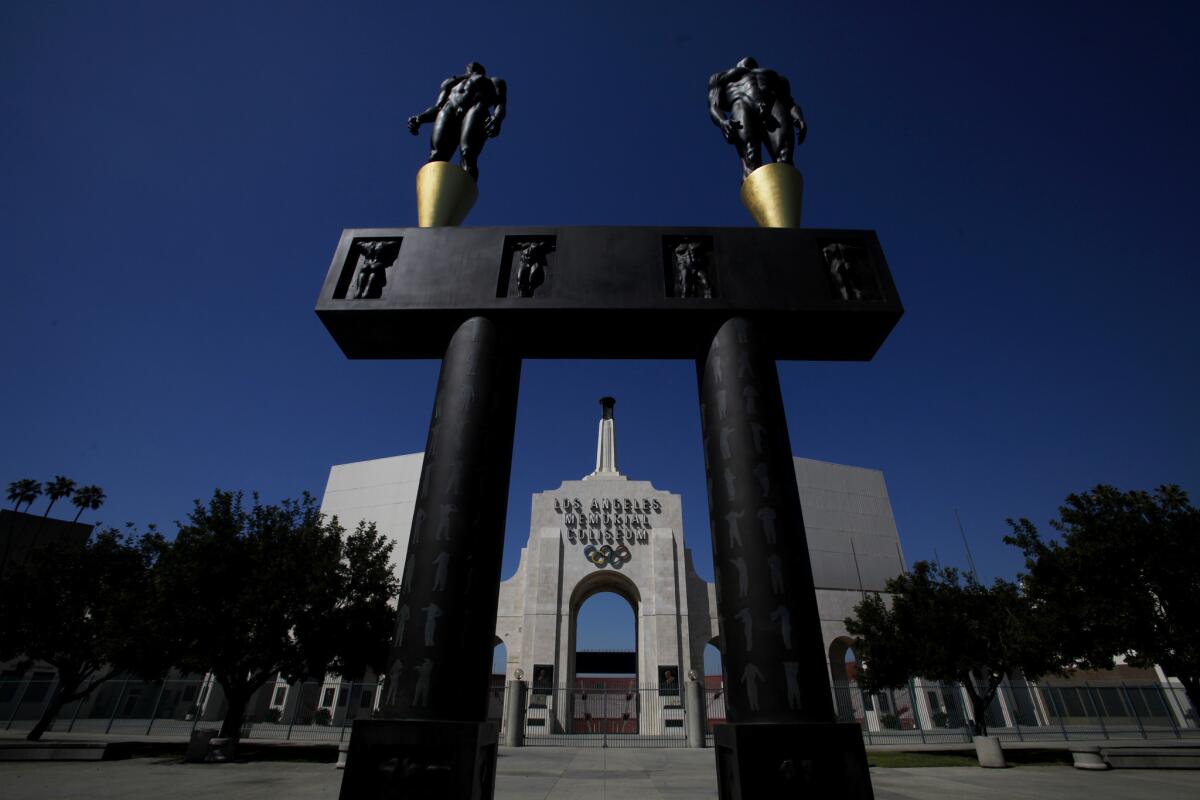Judge refuses to dismiss charges in L.A. Coliseum corruption case

The L.A. Memorial Coliseum’s former event manager is charged with taking at least $1.9 million from two concert promoters in exchange for helping them stage raves and keeping their costs down.
- Share via
A Los Angeles County judge on Monday rejected defense requests to dismiss charges in the L.A. Memorial Coliseum corruption scandal but criticized the district attorney’s office for failing to prevent a prosecutor from reading emails between one of the defendants and his attorneys.
Superior Court Judge Kathleen A. Kennedy said that the actions of the prosecutor were not a deliberate attempt to violate the rights of the defendants but said she was shocked that the office, particularly the “public integrity unit,” lacks proper training in handling evidence that could potentially fall under the attorney-client privilege.
“You above any other section in the DA’s office should be this high in terms of your own integrity in the way evidence is handled,” she said, raising her hand above her head. “You simply can’t do what was done in this case.”
Kennedy also rejected a defense request to remove the district attorney’s office from the case, paving the way for a new team of county prosecutors to proceed with the case, which is expected to go to trial this summer.
Monday’s ruling follows the district attorney’s office’s decision last month to remove the lead prosecutor and an investigator from the case “in an abundance of caution” after defense attorneys argued that the prosecutor violated the rights of a defendant by viewing emails he exchanged with his attorney.
Prosecutors took the action after attorneys for the stadium’s former event manager and two concert promoters facing trial in the case lodged allegations of “outrageous prosecutorial misconduct” over the viewing of the emails.
The Coliseum scandal grew out of a series of stories reported in The Times beginning in 2011.
The three defendants are accused in an alleged bribery and conspiracy scheme. Todd DeStefano, the stadium’s former event manager, is charged with taking at least $1.9 million from two concert promoters — Pasquale Rotella of Insomniac Inc. and Reza Gerami of Go Ventures Inc. — in exchange for helping them put on raves and keeping costs down.
In court documents, prosecutors describe DeStefano as a “tireless advocate” for keeping raves at the stadium complex even after a 15-year-old girl died after overdosing on Ecstasy at Insomniac’s June 2010 Electric Daisy Carnival rave. DeStefano, who at the time oversaw promoters as part of his governmental duties, resigned shortly after The Times began inquiring about his relationship with Insomniac.
Gary Jay Kaufman, who represents Rotella, accused Deputy Dist. Atty. Dana Aratani of deliberately and repeatedly reading emails Rotella had sent his attorneys, including Kaufman.
The district attorney’s office said the prosecutor used a “flawed” methodology to sort through more than 60,000 emails seized as evidence. Aratani’s viewing of the emails was “inadvertent” and didn’t prejudice the defendants’ rights to a fair trial, the office said.
In a response filed a couple of weeks later, Rotella’s attorneys argued that “nothing could be further from the truth” and urged Kennedy to dismiss the case to “send a message” to the district attorney’s office that such actions will not be tolerated.
Deputy Dist. Atty. Terrie Tengelsen filed a motion late last month opposing the defense requests to have the charges dismissed or the district attorney’s office recused from the case. In the motion, Tengelsen argued that the defense attorneys had “an ethical duty” to alert prosecutors that privileged communication was included in the seized evidence.
Kennedy said she did not believe that “Mr. Aratani was purposefully trying to trample the rights of the defendants in this case. He hadn’t gotten the right training and right procedures.”
Larry Bakman, who represents Gerami, said he found it hard to believe that the district attorney’s office had never dealt with similar circumstance in the past, and said the office had a duty to create policies and safeguards to properly guard against a prosecutor reading privileged communications between a defendant and defense attorneys.
“They got away with it,” he said after Monday’s hearing. “It shocks the conscience.”
Kaufman told the judge that the prosecutor’s conduct was “outrageous” and that allowing the office to remove a single prosecutor without a severe penalty condones such misconduct.
“It sends the message to the D.A. and to the public that they can read attorney-client material – just don’t get caught,” he said. “How is that a deterrent?”
Outside the courtroom, Kaufman said the dismissal of the charges would have been appropriate.
“We will move forward to prepare for complete exoneration of Mr. Rotella at trial,” he said.
Michael D. Nasatir, who represents DeStefano, said he and his client look forward to taking the case to trial.
“Mr. Destafano has always maintained his innocence and we hope and expect that the jury will also see it that way,” he said.
The district attorney’s office declined to comment on Kennedy’s ruling.
For more news from the Los Angeles County courts, follow @sjceasar and @marisagerber.
More to Read
Sign up for Essential California
The most important California stories and recommendations in your inbox every morning.
You may occasionally receive promotional content from the Los Angeles Times.












